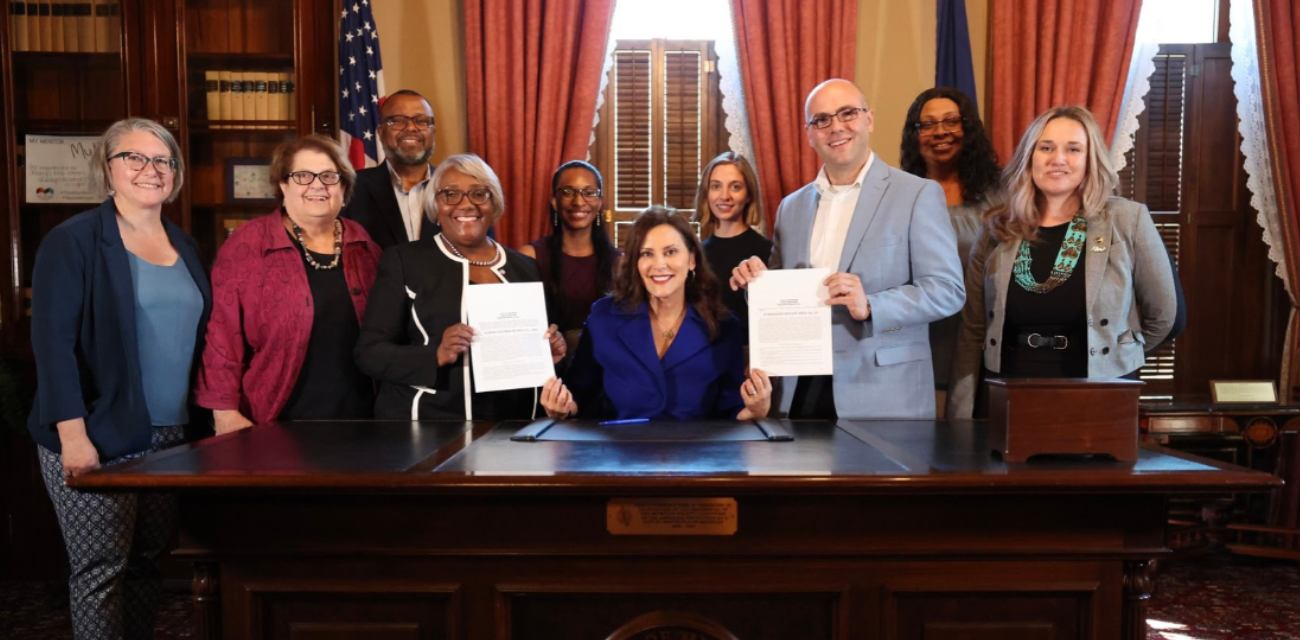The biggest moment in 45 years to end lead poisoning has arrived

Authored by
Lloyd’s hair stopped growing. Then it began to fall out. Dirt-like spots appeared on his feet. He was five then, learning to read and paint and make friends.
So Lloyd’s grandma, TaNiccia Henry, took Lloyd to the doctor and requested a lead test. With the prick of a finger, she found out Lloyd had lead levels seven times over what’s legally safe. Although, as Henry and health professionals will tell you, no amount really is.
The source of the poisoning turned out to be Henry’s 100-year-old house in Detroit’s Boston-Edison neighborhood. Lead was grinded into the paint, mixed into the dust, maybe even caked in the yard’s dirt. Lloyd had been inadvertently eating it for much of his life. Trace a hand across a side table, wipe it absently across the mouth, and lead infiltrates the body.
With a regimented diet, specialized house cleaning, and a watchful family, the lead in Lloyd’s blood has dropped to near nonexistence, but the damage has been done. He’s fallen behind his peers in math and reading and comprehension. Henry worries about how lead might impact him in the future: kidney problems, shortened attention spans, unchecked impulse control.
 “Realistically, I know this is going to be a lifelong problem, and I’m going to have to work extremely hard with him to make sure he hopefully lives a normal life,” she said of Lloyd. “Had he been tested at 1, 2, 3, 4, maybe it would’ve been better.”
“Realistically, I know this is going to be a lifelong problem, and I’m going to have to work extremely hard with him to make sure he hopefully lives a normal life,” she said of Lloyd. “Had he been tested at 1, 2, 3, 4, maybe it would’ve been better.”
While Lloyd’s history cannot change, similar stories will no longer be told in Michigan. That’s because in September of 2023, the Michigan Legislature approved lead tests for all toddlers in Michigan. Now, at least two tests will be incorporated into the routine checkups of 1 and 2 year olds. If lead is detected, children will be treated before the harm is too great.
It’s a law Henry and 184 other members of the Michigan Alliance for Lead Safe Homes (MIALSH) have advocated for since the group’s formation 13 years ago. With a swoosh of Governor Gretchen Whitmer’s pen, a state once infamous for its lead poisoning crises has become a national leader in protecting children from it.
“Universal testing will have the most profound impact on ending lead poisoning since lead paint was banned in 1978,” said Ellen Vial, Detroit program manager for the Environmental Council, which has convened MIALSH since its creation. “When paired with other great health legislation underway, 2023 could be a year of truly transformational change.”
MAKING LLOYD’S STORY HISTORY
Lead paint has been banned in products like paint since 1978, and the rate and intensity of lead poisoning in children has dropped because of it. But problems persist. It’s why MIALSH—the state’s leading lead poisoning prevention coalition, which is organized by the Michigan Environmental Council—is as active and effective as it’s ever been.
Lloyd’s story encapsulates the problem.
The median age of a Michigan home is almost 50 years old, leaving many potentially contaminated with lead, like Henry’s. Some of these homes have been bought or rented by dozens of families since construction. Few of these families know to get their children tested for lead, and Medicaid is the only major healthcare program that requires such tests. If their children do test for lead poisoning, the cost to remove the toxic metal from all parts of a house remains high.
According to MIALSH member Ecology Center, about 4,000 children test positive for lead poisoning in Michigan each year. Because mostly just children on Medicaid are tested, though, that number is likely an undercount
Lloyd himself was only tested because Henry knew to ask. But the onus should not be on the parents. Lead poisoning’s effects on the body and mind are myriad. They do not immediately surface after poisoning, nor are they easily spotted and connected to lead. The worst of Lloyd’s lead poisoning effects could have been averted if he had been regularly tested when he was much younger.
“A lot of people think that lead is an issue for poor people,” said Henry, a longtime Ford Motor Company employee. “No, it’s not. It’s not. At one point in time, I made very good money, and lead is still an issue, no matter how you do it. It knows no boundaries.”
Henry, who has since become a leader of MIALSH member Detroit Lead Advocacy Parent Group, knows the issues all too well. But she also knows how to limit them: get all children tested for lead and make the repair and renovation of lead-laden homes safer and more convenient.
 Universal lead testing legislation by Sen. John Cherry (D-Flint) and Rep. Helena Scott (D-Detroit) was just signed into law. It gets Michigan toddlers would be tested for lead regardless of what healthcare plan they’re on (unless their parents opt out). The tests would be added to a child’s regular checkup routine—just like an immunization. If lead is detected, treatment would be given and testing would increase.
Universal lead testing legislation by Sen. John Cherry (D-Flint) and Rep. Helena Scott (D-Detroit) was just signed into law. It gets Michigan toddlers would be tested for lead regardless of what healthcare plan they’re on (unless their parents opt out). The tests would be added to a child’s regular checkup routine—just like an immunization. If lead is detected, treatment would be given and testing would increase.
If this bill was law just a few years ago, Lloyd would have been tested and treated at his most critical time of childhood development, not just when his mom changed healthcare plans.
“It’s a great day for children’s health and the health and wellness of the people of Michigan,” Henry said the day legislation passed.
OTHER LEGISLATION WOULD GIVE A 1-2-3 PUNCH
Other legislation MIALSH and its members have long fought for and continue to fight for are moving, too, potentially making 2023, as Vial of the Environmental Council noted earlier, “a year of truly transformational change.”
On the heels of universal lead testing legislation are bipartisan bills in the House and Senate to install drinking water filters in all schools and childcare centers.
The filters will prevent lead found in fountains and taps from leaching into the water children and staff drink. Lead leaching is possible in water fixtures new and old and is especially prevalent in those left unused for long periods of time. That makes schools and childcare centers, with their many breaks and weekends, especially prone.
About $50 million was set aside to fund filter installation back in 2022; now it’s a matter of passing the legislation behind it. Sponsors include Sens. Sylvia Santana (D-Detroit) and John Cherry (D-Flint) and Reps. Curtis VanderWall (R-Ludington), Ranjeev Puri (D-Canton Township), and Cynthia Neeley (D-Flint).
For five years, the Filter First coalition has worked to get this sort of legislation introduced and passed. The Environmental Council and member group Ecology Center are leading organizations.
Read more about the Filter First effort from the eyes of parents and education professionals
Other legislation by Rep. Rachel Hood (D-Grand Rapids) would bring the federal Renovation, Repair, and Painting Rule into state control. This law requires building contractors to be trained and certified in lead safety practices as they repair and renovate old homes, but the federal program’s underfunding and divided attention has left few certified. State control would get more workers trained, who would then increase the amount of safe work done on lead-laden homes, keeping more children out of harm’s way.
Rep. Hood is also considering a small tax on paint which would fund lead poisoning prevention efforts. Both pieces of legislation are also longtime priorities of MIALSH.
What makes this year different? The Michigan Legislature now has a pro-public health majority, and MIALSH and the Filter First coalition educated lawmakers about the benefits long before bills were introduced this term. MIALSH hosts its annual Lead Education Day while the Filter First coalition has held a steady drumbeat of lawmaker meetings and public advocacy. With lawmakers familiarized with the issues, much of the timely politicking is taken out of the equation, creating a clearer pathway toward legislation passage.

“Universal lead testing would not be possible without the parents and healthcare workers who spent 13 years fighting for it,” said Melissa Cooper Sargent, environmental health advocate for the Ecology Center. “Now, lead poisoning can be caught and treated before it devastates children’s mental and physical development. All children will be better able to thrive at school, at home, and with friends.”
In other words, 2023 is the chance to officially end stories like Lloyd’s. We can make their tragedies history, not current reality.
A previous version of this article was published on May 5, 2023.
Discover
Power environmental change today.
Your gift to the Michigan Environmental Council is a powerful investment in the air we breathe, our water and the places we love.
Sign up for environmental news & stories.
"*" indicates required fields




